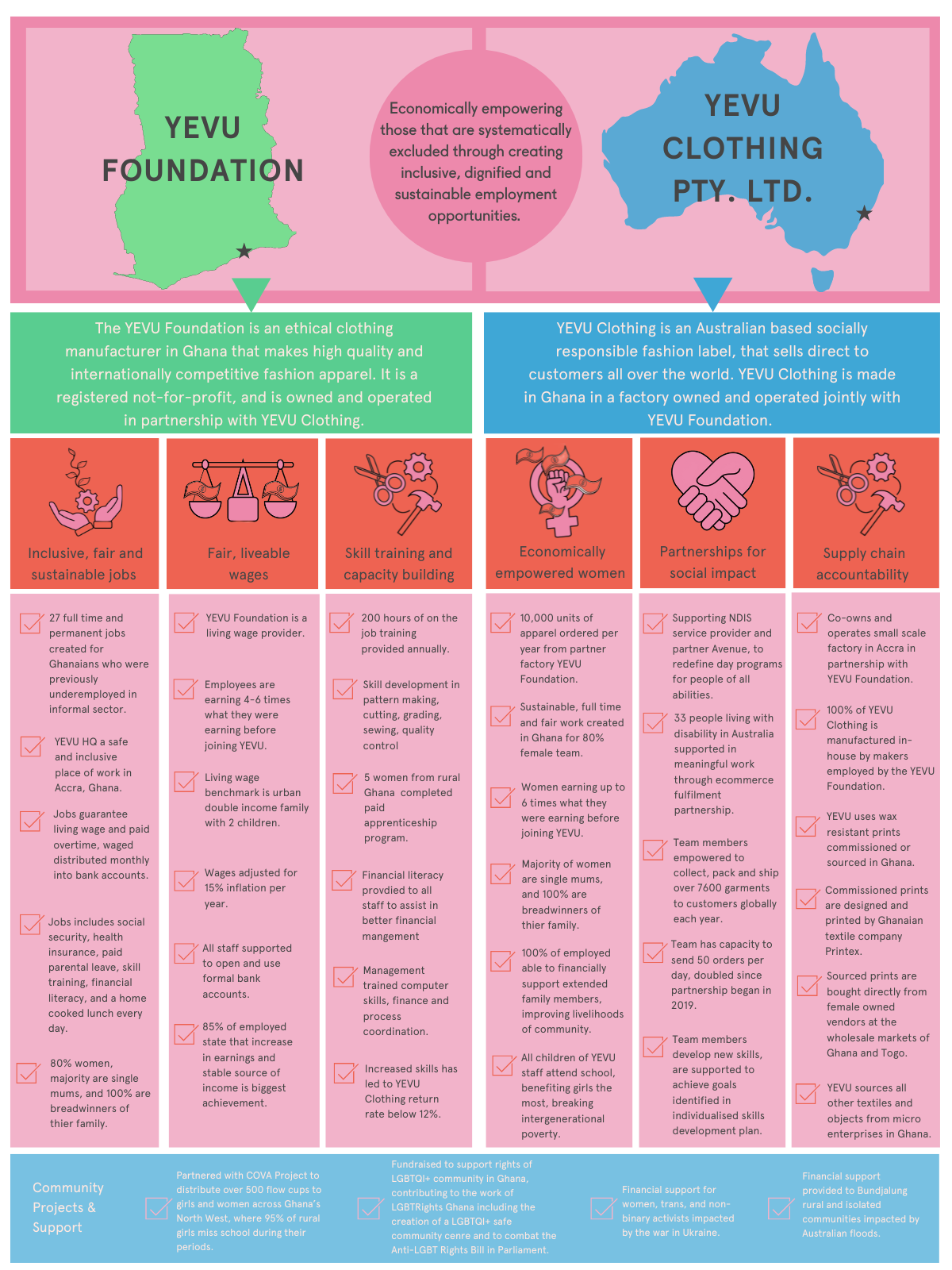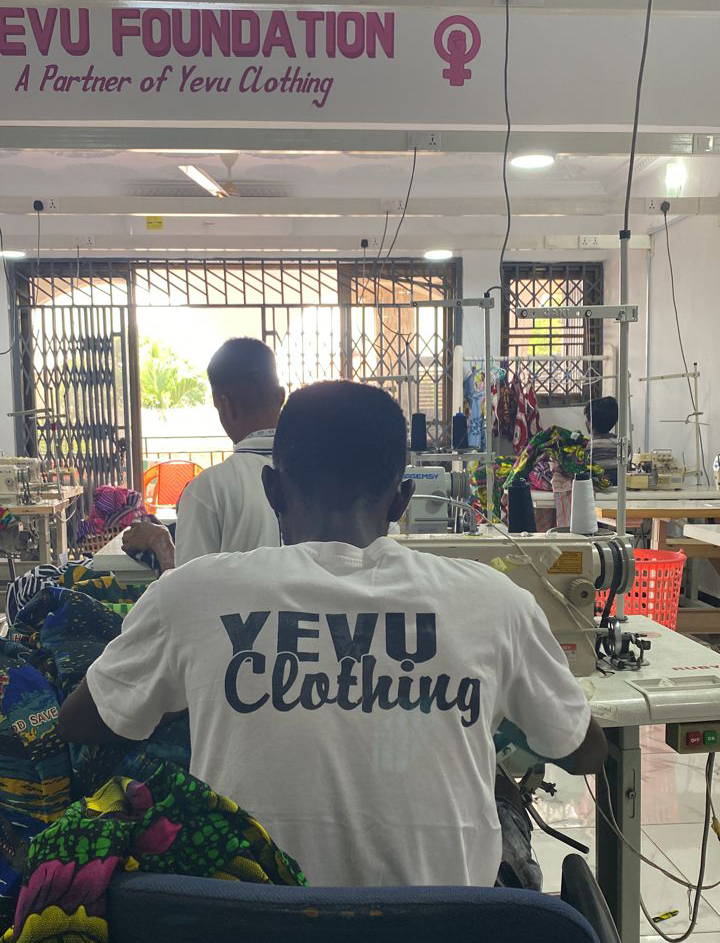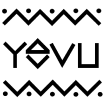Our Impact
1. We create fair and sustainable jobs.
# 30 formerly unemployed and financially vulnerable people have been employed in full time jobs since inception.
# 80% are women. One third are single mums.
# 10,000 units of clothing manufactured annually, and growing. Over 10 years, we have made, shipped and sold over 50,000 units of YEVU Clothing.
# Over 100,000 yards of wax print fabric bought from female led micro-enterprises.
2. We pay above living wage
2. We pay above living wage.
# YEVU staff earn 4-6 times what they were making before joining YEVU.
# All YEVU workers earn above the living wage (based on current living wage data in Ghana).
# 100% paid through monthly mobile money transfers or bank transfers to each individual.
# 100% of current female YEVU employees are formally banked.
# For over 85% of our team, YEVU income pays for school fees, food for their families, rent, family healthcare and emergencies.
3. We invest in workforce development.
# 200 hours of training provided to the team in technical skills per year.
# We run a free apprenticeship program for young disadvantaged women, with at least 5 trainees graduated.
# 30 team members up skilled in financial literacy.
# 58% of our team can now make patterns with no assistance and 92% are totally confident cutting large quantities of cloth.
# 100% of our team feel that their technical skills are better than their counterparts because of YEVU.
4. Women's economic empowerment.
# 170 family and community members dependent on the income generated through YEVU.
# Every child of every YEVU team member attends school.
# 88% of our team feel that they are a person of worth and equal to others. For the women, this is derived from access to income, total independence and self-sufficiency as a single mum.
# 94% of our team feel like new skills and capabilities learnt through YEVU will help them to achieve their dreams.
# Women that work for YEVU are breadwinners.
1. We create fair and sustainable jobs.
Since inception, we have provided full time jobs to over 30 people who were previously unemployed or underemployed in the informal sector. On average, 70% of those that have worked for us are women - many of them are single mothers and primary caretakers. Seamstresses and tailors make up the majority of our team, but there are many extra hands that contribute to making YEVU a reality, including studio coordinators, drivers, security guards, nannies, fabric washers, ironers, screen printers, kente weavers, logistics coordinators and textile wholesalers - just to name a few.
Many women who work for us have had experience running micro-enterprises in Ghana's informal sector, but in an unstable economy and access limited to the local market, making ends meet on a few customers is incredibly challenging, let alone supporting a whole family. That's why connecting international markets (that's you guys - our customers) to these producers is essential in ensuring these jobs remain sustainable. And when we say "sustainable", we mean stable and dependable employment that generates full time income sufficient enough to not only live on, but to also enable a change in circumstance for the individual, family and community member.
In 2022, after outgrowing our last workshop, we upgraded and long term leased a large residential property on a spacious compound in Pokuase, Accra. We converted the main open plan communal area of this house into our primary sewing centre with around 16 machines. The other parts of the house have been converted into the various stations of the production line, including pattern cutting, quality control, warehouse, print preparation and even a photography studio. This is where the magic happens, and as of 2023 we are offering manufacturing services to other brands and businesses that want to make ethical clothing on the continent. Learn more here - https://www.yevufoundation.com/
2. We pay above living wage.
At YEVU, our staff are paid, at a minimum, Ghana’s living wage which equates to around 4-6 times what they were earning before they joined YEVU. This living wage includes the provision of basic benefits, including social security, health insurance and a cooked lunch every day. More on Ghana's living wage, and the data around that, can be found here.
The living wage we measure against is of a double income family in Ghana that is supporting two children. Providing single mums with a sustainable income means that as the breadwinners, they can send their children to school on their sole salary, provide for the whole household, and also have enough for emergencies and to save. Education, especially for girls, goes a long way in breaking the cycle of intergenerational poverty. Ghana has gone through periods of economic crisis, where inflation is as high as 40% per annum. We adjust our wages every year for inflation, increased 15 on average, but in crisis we peg the GHC to the AUD and ensure wages are increased on par with the increase in cost of living. We pay all staff monthly, through direct bank transfers now that all our staff are formally banked.
3. We invest in workforce development.
Training our team in technical skills has been a key factor in creating a product that is viable in an international market. It has also been essential in forming a powerhouse team that looks out for each other, teaches each other and learns from each other. Australian designers have spent a total of 380 hours in our Accra workshops, working directly with individual seamstresses and tailors in order build their skills in pattern making, garment construction, sewing techniques, grading and finishes. Our Head of Production and senior makers are now proving around 00 hours of skill training and capacity building to the larger team every year. Designs are being realised from beginning to end in Ghana, and there is an incredible sense of pride in the work that is being produced and loved by a global customer base.
At YEVU, the vast majority of people that we hire are amongst Ghana's financially excluded, with women accounting for around 80%. Our goal is to bank every one of our employees, ensure they are paid directly into their bank account and simultaneously have access to financial literacy tools to help them navigate the at times exploitative world of banking products. In 2021 we partnered with Ecobank to open formal bank accounts for all staff and run workshops that covered saving for future and family, budgeting and preventing costly loans.
In 2019 we introduced an apprenticeship training program for young disadvantaged women who do not have access to employment or continued education. We provide them with machines, a roof over their heads, a stipend, freshly cooked lunches daily and mentorship and training from our Head of Production and Senior Seamstresses.
4. We see the transformative impact of economically empowered women.
Here's the tricky bit - how can we know that sustainable jobs, fair income and workforce development can contribute to a sense of empowerment? It's easy to say that we've seen this first hand; like when our Production Manger Felicia, who had never used a computer before, was inspired to enrol in ITC night classes at a local college; or when Philomena, a single mum of three, was able to send her youngest daughter to school with a uniform and textbooks for the first time; or even just by looking at the number of women who have moved from apprentices to leaders in the YEVU workforce, teaching other women what they have learnt - however, we also think it's important to try and capture whether or not some change has occurred amongst the women that work for us by using methods other than just anecdotal.
We conduct interviews with our team in Ghana so we can get some insight into the ripple effect that investing in women can have, like how earning 4-6 times what they were earning before joining YEVU has affected the health and education of their families. The majority of women tell us that they are spending this income on sending their daughters to school; that they are saving and feeling financially secure and independent; they are building bigger, better and more secure houses; that they have been able to pay for the hospital fees of relatives during health emergencies; and they are supporting the general and ongoing health and education needs of extended family and friends, over 170 dependants last time we checked.
Using the Oxfam framework for measuring women's economic empowerment as our guide, we gathered data that will help us better understand and measure "empowerment" experienced by the women that we employ. Questions address feelings of self confidence, individual capability, attitudes towards women's economic role, control over household assets and decision making. In our last impact survey, conducted in June 2018, an external evaluator interviewed 16 current and past employees in Ghana, 75% of which were women. In summary, our findings revealed that:
Feelings about self:
88% of female respondents strongly feel that they are a person of worth, equal to others. Feelings of worth are derived from access to income, total independence and self-sufficiency as a single mum.
94% of female respondents strongly feel like they have the skills and capabilities to achieve their dreams, citing the technical skills they’ve gained through YEVU as well as customer relations and financial management skills as reasons why.
All the women feel that their sewing skills are better than other makers, as they've learnt how to use industrial machinery, how to pattern make, and they cite that YEVU’s stringent quality control mechanisms mean that their work will be scrutinised and must be of a very high standard. Others in the profession in Ghana don’t have these expectations placed on them.
100% of female respondents state that they are, to a large extent, able to produce consistently across large quantities of style and size, a skill that was many did not posses when we they commenced work with YEVU, citing production sizes of up to 350 units per size/style. 92% are confident in cutting cloth in large quantities.
Everyone we interviewed felt like they had learnt new skills in the last 12 months, stating that a greater volume of work has increased their skills through on the job practice. Pattern making was specifically mentioned by 26% of respondents.
Out of those interviewed 63% have their own bank accounts, and 100% of current female YEVU employees have bank accounts. Of those that have bank accounts, 60% have been able to save the money they had planned on saving. Family and other emergencies have been a factor for those that were unable to save.
94% of female respondents strongly feel like they have the skills and capabilities to achieve their dreams, citing the technical skills they’ve gained through YEVU as well as customer relations and financial management skills as reasons why.
Around 88% of female respondents believe that women and men can both be leaders. One of YEVU’s lead female makers stated that before working for YEVU, she believed that men and woman had separate roles, but since being employed at YEVU, she feels empowered to stand up. Another female employee believes that women talk too much and men talk less and do more.
100% of respondents agree that a women are equally as capable of managing finances as their male counterparts. One of the single mothers believes that women are very capable, without being able to rely on anyone else, but an education helps.
Every single respondents agree that men and women deserve equal pay for equal work. One female participant thinks that women should in fact be paid more than men! Why not, we say.
Feelings about relationships:
Around 73% of the female respondents stated that they have enough freedom within their household to travel to visit relatives and friends outside their community without the input of their husbands.
All female participants have the ability to choose how many children they’d like to have, be it independently or with the joint input of their husband.
Over 80% of female respondents make joint decisions about how to spend the money they make, with only 2 out of 12 respondents stating that they have full independence over spending their own income.
87% of female participants are members of religious groups, with the majority feeling like they have influence to make decisions within this group to a medium and large extent.
88% of our team believed that they are on the right path to achieve their life dreams:
38% (6/16) of respondents dream of owning their own workshop, becoming a master of their craft and employing and training others in order to expand the business.
19% (3/16) of respondents dream of building their own house with the money they earn at YEVU.
19% (3/16) of respondents dream of being able to support their entire family and provide all their needs through the income from YEVU.
7% (1/16) dream of furthering their education.
Meet some of the women that make your YEVU!




Our Structure and Impact
We have a unique structure that is based on partnerships and putting our people first. The YEVU Foundation was established by YEVU Clothing in 2012 in order to create jobs in Ghana and build a skilled workforce that could produce 100% of YEVU Clothing. Fulfilling the long term plan for YEVU, in 2022 the capacity of the Foundation workforce exceeded the needs of YEVU Clothing. Proudly, the YEVU Foundation started its transition to independent and local ownership and operation, laying the path for financial sustainability and locally led growth. Today, the YEVU Foundation is able to offer their manufacturing services to other brands and businesses wanting to produce ethically in Ghana.

The YEVU Foundation
The YEVU Foundation is an ethical clothing manufacturer in Ghana that has been making high quality and internationally competitive fashion apparel for almost a decade.
We own and operate a small but growing fully facilitated factory in Accra where we cut, sew, design, sample, learn, create and connect, and also come together in a happy, safe and welcoming space.
Up until 2022, the YEVU Foundation has been the sole supplier to partner YEVU Clothing, a socially responsible label made in Ghana.

